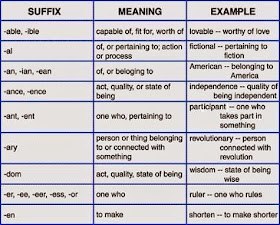1) FLEXIBILITY OF FORM
The same form of a word can act as different parts of speech (noun, verb...) with little or no change.
Example: "PARTS OF THE BODY"Can you remember any vocabulary of this group?
Once you have, can you complete the following sentences using a verb (in the correct tense) which denotes a part of the body.
- Could you _________ me that book on the table next to you?
- In the final minutes of the football match, Ronaldo _________ the ball into the back of the net.
- She ____________ the car carefully out of the garage and drove off.
- After her father’s death, Mary had to _____________ the responsibilty of her family’s debts.
- The bank robber was ___________ with a knife and a gun.
- I ran out of petrol, so I had to _________ a lift to the nearest petrol station.
- Could you _________ me that book on the table next to you?
- In the final minutes of the football match, Ronaldo _________ the ball into the back of the net.
- She ____________ the car carefully out of the garage and drove off.
- After her father’s death, Mary had to _____________ the responsibilty of her family’s debts.
- The bank robber was ___________ with a knife and a gun.
- I ran out of petrol, so I had to _________ a lift to the nearest petrol station.
2) COMPOUNDS: TWO WORDS TOGETHER MAKE UP A NEW WORD.
Example: "PARTS OF BODY" Compounds with HEAD-
- headlights: front lights of a car
- headlines: of a newspaper the lines that show the important news
- headstone: stone in a cementery with the information of the person buried
- headband: band that sportspersons wear around their head to keep their hair off their eyes
- headquarters: main offices of a company or organization
Can you find compound words with EYE, HAIR and FINGER?
3) DERIVATION.New words made up from suffixes or prefixes added to the same root.
- Some common suffixes. When are they used? Look at the examples:
- to make nouns:
-ESS (actress)
-ER/-OR, (teacher/actor)
-EE, (employee, referee)
-(T)ION, (action)
-IST/-ISM, (journalist, journalism)
-NESS, (happiness)
-MENT, (government)
-NGTH, (strength, length)
-Y/-TY, (nationality)
-HOOD, (neighbourhood)
-SHIP (friendship)
- to make adjectives:
-ABLE/-IBLE, (comfortable, sensible)
-IVE, (sensitive)
-AL, (industrial)
-OUS, (famous)
-FUL, (useful)
-LESS, (useless)
-ISH/-ESE/-CH (Spanish, Japanese, French)
-ER/-EST (bigger, biggest)
- to make verbs:
-ISE/-IZE, (modernize)
-IFY (identify)
- to make adverbs:
-LY (happily)
- Some common prefixes (some have a Latin origin): Look at their meanings and some examples for each:
UN-/IN-/IM-/IR-/DIS-/DE- = negative/opposite (unidentified, incorrect, impossible, irregular, dishonest, defrost)
ANTI- = not in favour, against (antisocial)
AUTO- = of oneself/one’s own (autobiography)
BI- = two (bilingual)
CO- together with (co-pilot, cooperate)
EX- = former/not anymore (ex-husband, ex-wife)
INTER- = between/among (international)
MICRO- = very small (microphone, microwave)
MIS- = wrong/incorrect (mistake)
MONO- = one (monolingual)
MULTI- = many (multilateral)
OVER- = too much (overweight)
POST- = after (postgraduate)
PRE- = before (predict)
PRO- =in favour of (pro-American)
RE- = again (redecorate)
SEMI- = half (semifinal)
SELF- = alone, on one’s own (selfconfidence)
SUB- = underneath (subtitle)
TRANS- = from one place to another (transatlantic)
UNDER- = not enough / underneath (undercook, underground)
[Answers to exercises:
1- (parts of body used as verbs) hand / headed / backed / shoulder /armed/ thumb
2- (compounds) eyeball, eyebrow, eyecatching, eyedrops, eyelashes, eyelid, eyeliner, eye-opener, eyesight, eyewitness / hairband, hairbrush, hairclip, haircut, hairdo, hairdresser, hairdrier, hairnet, hairpiece, hairpin, hairspray, hairstyle / fingerboard, fingermark, fingernails, fingerprint, fingertip]



Great Article, with full of helpful Informations. thanks
ReplyDelete